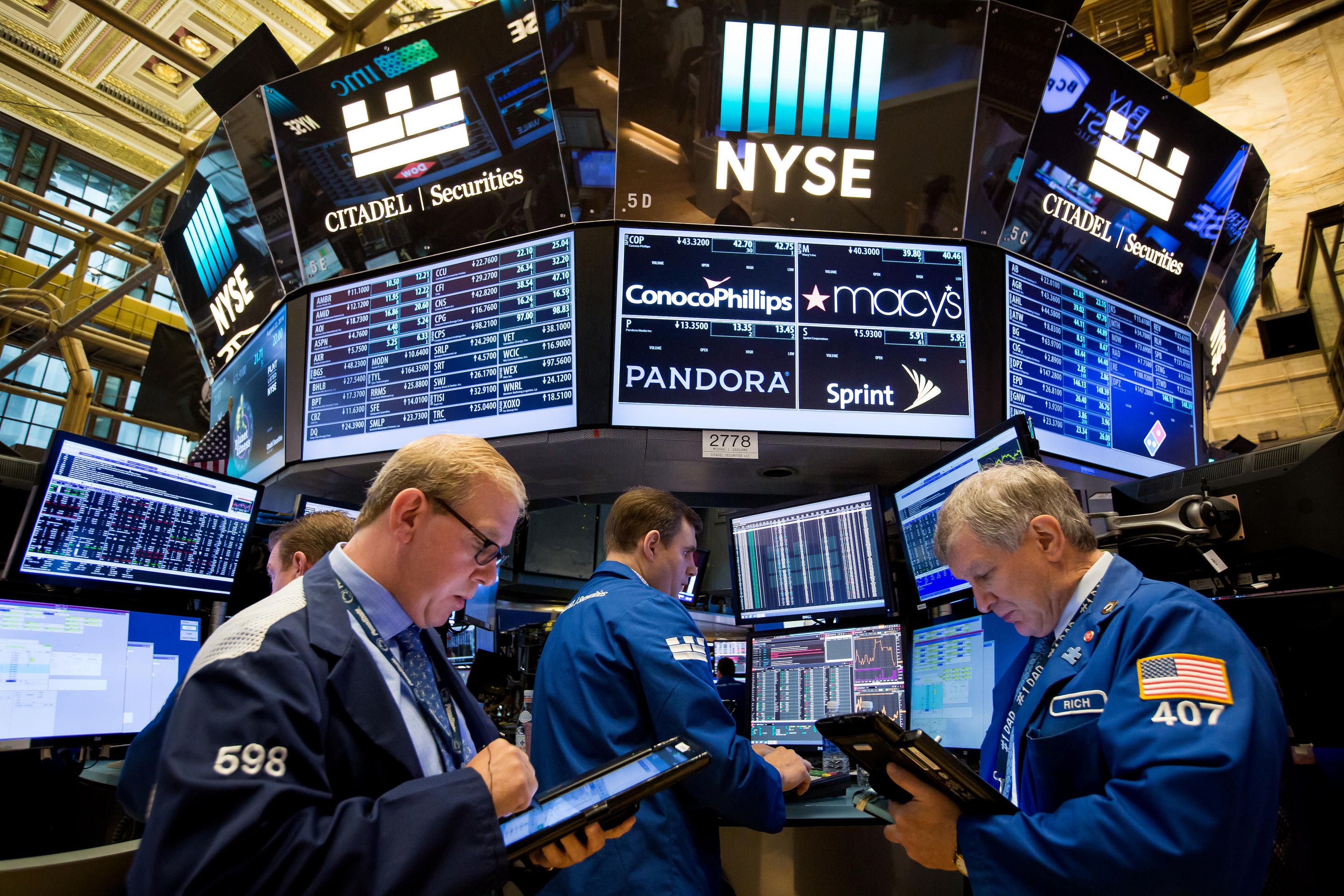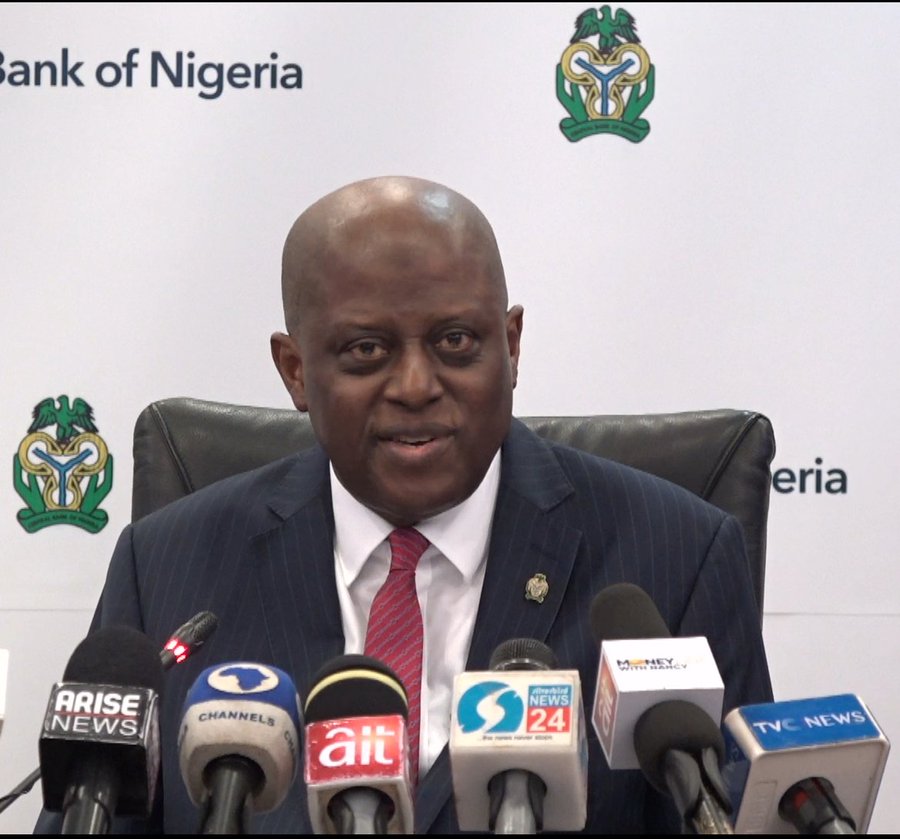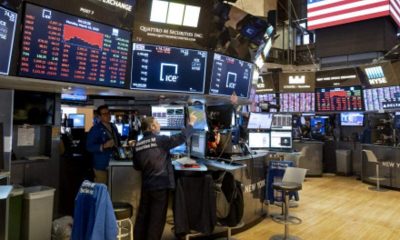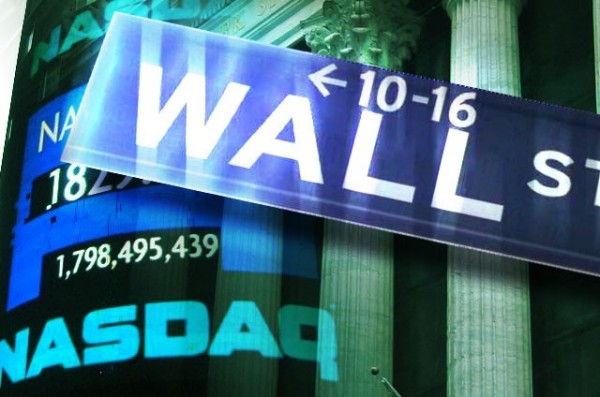Economy
US Stocks Open Higher on Bargain Hunting

By Investors Hub
The major U.S. index futures are pointing to a higher opening on Wednesday, with stocks likely to regain some ground following the weakness seen in the previous session.
The markets may benefit from bargain hunting following the pullback on Tuesday, which saw the Dow slump by nearly 300 points.
Notable strength seen in the overseas markets on the day may also generate some early buying interest on Wall Street.
Trade concerns may continue to weigh on the markets, however, as traders worry about an escalating trade dispute between the U.S. and China.
After showing a significant move to the downside early in the session, stocks regained some ground over the course of the trading day on Tuesday. The major averages climbed well off their worst levels of the day but still closed in negative territory.
The major averages all finished the session in the red, although the Dow underperformed its counterparts by a wide margin. The Dow tumbled 287.26 points or 1.2 percent to 24,700.21, while the Nasdaq fell 21.44 points or 0.3 percent to 7,725.58 and the S&P 500 slid 11.18 points or 0.4 percent to 2,762.57.
Trade war concerns weighed on Wall Street after President Donald Trump directed U.S. Trade Representative Robert Lighthizer to identify $200 billion worth of Chinese goods for additional tariffs at a rate of 10 percent.
Trump said the tariffs will go into effect if China refuses to change its unfair trade practices and insists on going forward with recently announced tariffs.
The potential tariffs announced by Trump come as the U.S. and China both announced plans to impose tariffs on up to $50 billion worth of goods imported from the other country.
Trump threatened to pursue additional tariffs on another $200 billion worth of goods if China increases its tariffs yet again.
“The United States will no longer be taken advantage of on trade by China and other countries in the world,” Trump said. “We will continue using all available tools to create a better and fairer trading system for all Americans.”
Despite the threat from Trump, China vowed to retaliate with “strong” countermeasures if the U.S. goes ahead with the new tariffs.
“This practice of extreme pressure and blackmail deviates from the consensus reached by both parties on many occasions and is disappointing for the international community,” the Commerce Ministry said in a statement.
The statement added, “The United States has initiated a trade war that violates market laws and is not in accordance with current global development trends.”
In U.S. economic news, the Commerce Department released a report showing a much bigger than expected jump in new residential construction in the month of May, although the report also showed a much steeper than expected drop in building permits.
The report said housing starts spiked by 5.0 percent to an annual rate of 1.350 million in May after tumbling by 3.1 percent to a revised rate of 1.286 million in April.
Economists had expected housing starts to climb by 1.8 percent to a rate of 1.310 million from the 1.287 million originally reported for the previous month.
Meanwhile, the Commerce Department said building permits plunged by 4.6 percent to an annual rate of 1.301 million in May after falling by 0.9 percent to a revised rate of 1.364 million in April.
Building permits, an indicator of future housing demand, had been expected to edge down by 0.1 percent to a rate of 1.350 million from the 1.352 million originally reported for the previous month.
Steel stocks turned in some of the market’s worst performances on the day, as traders worried about the potential impact of a trade war between the U.S. and China.
Reflecting the weakness in the steel sector, the NYSE Arca Steel Index slumped by 2.3 percent to its lowest closing level in over two months.
Significant weakness was also visible among chemical stocks, as reflected by the 1.8 percent loss posted by the S&P Chemical Sector Index.
Transportation, semiconductor, and computer hardware stocks also saw notable weakness, while biotechnology and utilities stocks showed strong moves to the upside.
Economy
NECA, CPPE Laud CBN’s 0.50% Interest Rate Cut

By Adedapo Adesanya
The Nigeria Employers’ Consultative Association (NECA) and the Centre for the Promotion of Private Enterprise (CPPE) have separately commended the Central Bank of Nigeria (CBN) for reducing the Monetary Policy Rate (MPR) from 27.0 per cent to 26.5 per cent at its 304th Monetary Policy Committee (MPC) meeting.
In reaction, NECA Director-General, Mr Adewale-Smatt Oyerinde, praised the decision in a statement, noting that the 50 basis-point cut is “a cautious but noteworthy signal” that authorities were responding to sustained pressures on businesses.
He said the marginal reduction might not immediately lower lending rates, but reflected “a gradual shift toward supporting growth without undermining price stability”.
According to him, the overall stance remained tight, with the Cash Reserve Ratio retained at 45 per cent and the liquidity ratio at 30 per cent.
He added that the asymmetric corridor around the MPR was also maintained, reinforcing a cautious monetary approach.
“With a substantial portion of deposits still sterilised, banks’ capacity to expand credit to the real sector may remain constrained in the near term,” he said.
Mr Oyerinde described the move as “a careful balancing act” aimed at moderating inflation without worsening pressures on businesses.
He noted that firms continued to grapple with high operating costs, exchange rate volatility and weakened consumer demand.
“Inflation, particularly in food, energy and transportation, remains a significant challenge to employers and households,” he said.
He stressed that the modest easing must be supported by coordinated fiscal and structural reforms to address supply-side constraints.
Such reforms, he said, should improve infrastructure and enhance productivity across key sectors of the economy.
Mr Oyerinde urged financial institutions to ensure the MPR reduction was gradually reflected in lending conditions for manufacturers and SMEs.
He affirmed that although the MPC had not fully relaxed its tightening stance, the rate cut signalled cautious optimism.
“Sustained improvements in inflation, exchange rate stability and investor confidence will determine scope for further easing that supports growth and employment,” he said.
On its part, the CPPE said the decision reflected improving macroeconomic fundamentals and a cautious shift from aggressive tightening.
The organisation noted that sustained disinflation, stronger external reserves, an improved trade balance and relative exchange-rate stability had created room for monetary easing.
It said the rate cut could boost investor confidence and support private-sector growth, but cautioned that weak monetary transmission might limit its impact on lending rates.
The CPPE identified high cash reserve requirements, elevated lending rates, government borrowing and structural banking costs as major constraints to effective transmission.
The group also stressed the need for fiscal consolidation, citing high public debt, persistent deficits and rising debt-service obligations as risks to macroeconomic stability.
According to the chief executive of CPPE, Mr Muda Yusuf, effective policy coordination and stronger transmission mechanisms were critical to unlocking investment and sustaining growth, lauding the CBN for what he described as a measured and data-driven policy adjustment.
The CPPE boss noted that the easing reflected strengthening macroeconomic performance, declining inflation, growing reserves, improved trade balance and enhanced foreign exchange stability.
Mr Yusuf added that for the benefits of monetary easing to be fully realised, authorities must strengthen transmission to ensure lower lending rates for the real sector and advance credible fiscal consolidation to safeguard stability.
He said that if supported by structural reforms and disciplined fiscal management, the current policy direction could unlock a stronger investment cycle and more durable economic growth.
Economy
NASD Index Falls 0.28% as Investors Lose N6.64bn

By Adedapo Adesanya
The NASD Over-the-Counter (OTC) Securities Exchange extended the negative start to the week by 0.28 per cent on Tuesday, February 24, with the market capitalisation down by N6.64 billion to close at N2.378 trillion versus Monday’s N2.384 trillion, and the NASD Unlisted Security Index (NSI) falling by 11.1 points to 3,974.80 points from 3,985.90 points.
At the session, transaction value skyrocketed by 1,706.3 per cent to N1.2 billion from the previous day’s N61.8 million, as the transaction volume increased by 59.1 per cent to 11.6 million units from 7.3 million units, and the number of deals expanded by 23.1 per cent to 48 deals from the preceding session’s 39 deals.
Central Securities Clearing System (CSCS) Plc remained the most active stock by value on a year-to-date basis with 33.7 million units exchanged for N2.0 billion, Okitipupa Plc was next with 6.2 million units traded for N1.1 billion, and Geo-Fluids Plc occupied the third position with 121.0 million units valued at N474.9 million.
Resourcery Plc emerged as the most traded stock by volume on a year-to-date basis with 1.05 billion units worth N408.7 million, followed by Geo-Fluids Plc with the sale of 121.0 million units for N474.9 million, and CSCS Plc with 33.7 million units worth N2.0 billion.
Yesterday, the market breadth was flat after the bourse finished with three price gainers and three price losers led by MRS Oil Plc, which shed N14.50 to close at N200.00 per share versus the previous day’s N214.50 per share, CSCS Plc depleted by N1.39 to N65.82 per unit from N67.21 per unit, and Geo-Fluids Plc depreciated by 1 Kobo to close at N3.30 per share versus Monday’s N3.31 per share.
The price gainers were led by FrieslandCampina Wamco Nigeria Plc, which improved its value by N1.60 to close at N95.00 per unit compared with the preceding session’s N93.40 per unit, Afriland Property Plc gained 83 Kobo to sell at N18.00 per share versus N17.17 per share, and First Trust Mortgage Bank Plc advanced by 13 Kobo to N1.45 per unit from N1.32 per unit.
Economy
Nigerian Exchange Sheds 0.92%

By Dipo Olowookere
The Nigerian Exchange (NGX) Limited depreciated by 0.92 per cent on Tuesday after the Central Bank of Nigeria (CBN) slashed the benchmark interest rate by 0.5 per cent to 26.50 per cent at the end of its first Monetary Policy Committee (MPC) meeting for 2026.
Sell-offs mainly occurred in the consumer goods and insurance sectors, shedding 4.74 per cent and 1.31 per cent, respectively.
However, bargain-hunting remained in the others, with the industrial goods index gaining 1.92 per cent, the banking counter grew by 1.23 per cent, and the energy sector soared by 0.15 per cent.
When the bourse ended for the session, the All-Share Index (ASI) gave up 1,779.03 points to close at 194,484.52 points compared with the previous day’s 196,263.55 points, and the market capitalisation declined by N1.142 trillion to N124.827 trillion from N125.969 trillion.
DAAR Communications depreciated by 10.00 per cent to N2.25, Tantalizers also declined by 10.00 per cent to N4.86, BUA Foods shrank by 9.99 per cent to N760.60, Ellah Lakes slumped 9.96 per cent to N10.40, and Japaul lost 9.95 per cent to trade at N3.80.
Conversely, Jaiz Bank appreciated by 10.00 per cent to N12.76, Infinity Trust Mortgage Bank went up by 9.83 per cent to N19.00, FCMB gained 9.72 per cent to close at N13.55, Fortis Global Insurance chalked up 9.09 per cent to finish at 72 Kobo, and Sterling Holdco grew by 7.50 per cent to N8.60.
A total of 27 stocks ended on the gainers’ chart and 40 stocks finished on the losers’ table, indicating a negative market breadth index and weak investor sentiment.
Yesterday, investors bought and sold 1.1 billion equities worth N53.4 billion in 72,218 deals compared with the 1.3 billion equities valued at N31.5 billion in 95,091 deals recorded a day earlier.
This showed that the value of transactions went up by 69.52 per cent, the volume of trades declined by 15.39 per cent, and a slip in the number of deals by 24.05 per cent.
During the session, Japaul was the most active stock with 102.4 million units worth N399.8 million, Access Holdings exchanged 97.9 million units valued at N2.6 billion, Fortis Global Insurance traded 75.2 million units for N54.1 million, Zenith Bank sold 67.6 million units valued at N6.2 billion, and FCMB transacted 46.4 million units worth N612.2 million.
-

 Feature/OPED6 years ago
Feature/OPED6 years agoDavos was Different this year
-
Travel/Tourism10 years ago
Lagos Seals Western Lodge Hotel In Ikorodu
-

 Showbiz3 years ago
Showbiz3 years agoEstranged Lover Releases Videos of Empress Njamah Bathing
-

 Banking8 years ago
Banking8 years agoSort Codes of GTBank Branches in Nigeria
-

 Economy3 years ago
Economy3 years agoSubsidy Removal: CNG at N130 Per Litre Cheaper Than Petrol—IPMAN
-

 Banking3 years ago
Banking3 years agoSort Codes of UBA Branches in Nigeria
-

 Banking3 years ago
Banking3 years agoFirst Bank Announces Planned Downtime
-

 Sports3 years ago
Sports3 years agoHighest Paid Nigerian Footballer – How Much Do Nigerian Footballers Earn















